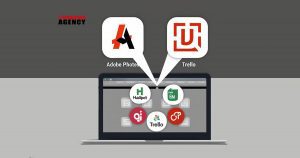Software development is crucial in determining our technological environment in the digital age. Software development refers to various tasks in developing, maintaining, and designing computer programs. Understanding the types of software development is crucial, whether creating a mobile app, a website, or business software.
The diverse approaches and areas of expertise involved in each type of software development will be discussed in this article as we look at various kinds of software development, from web development to mobile app development.
Let’s explore the fascinating world of software development now.
Types of Software Development
Following are the kinds of software development that a developer must know:
- Front-End development
- Back-End development
- Full stack development
- Application development
- API development
- Data science
- Mobile development
- Desktop development
- Blockchain development
- Security software development
1. Front-End Development:
Front-End development concerns the user interface and user experience aspects of software applications. Using HTML, CSS, and JavaScript involves developing engaging and interactive interfaces.
To achieve seamless user experiences, front-end engineers collaborate closely with designers. They concentrate on enhancing the functionality, responsiveness, and accessibility of websites.
The following are the technology frameworks frequently used in front-end development, allowing developers to create complex and engaging user interfaces.
- Angular
- React
- Vue. Js
2. Back-End Development:
Building the server-side components for software applications is a function of back-end development. Back-End developers manage duties including data storage, retrieval, and business logic while utilizing programming languages such as:
- Java
- Python
- PHP
They collaborate closely with databases, APIs, and other infrastructure parts to guarantee the smooth operation of the application.
The management of user authentication, the processing of server requests, and the implementation of server-side algorithms fall under the purview of back-end developers.
These are some of the frameworks frequently used by back-end developers to speed up development:
- Node.js
- Django
- Ruby on Rails
3. Full Stack Development:
Full-stack development enables developers to work on both sides of an application by combining front-end and back-end development expertise.
Full-stack developers, whom software development companies frequently hire, are knowledgeable in various technologies and capable of managing every aspect of software development.
These developers create end-to-end solutions because they are familiar with client- and server-side technologies. They are significant assets for software development organizations due to their competence in both front-end and back-end development.
Furthermore, full-stack developers can assist in project development phases and work well with various teams.
4. Application Development:
Application development is building software programs specialized for particular uses or sectors. It includes
- Business tools
- Education apps
- Medical services, and more.
Application designers work closely with stakeholders to comprehend needs and provide original software solutions.
They create programs that cater to particular business demands using a variety of programming languages, frameworks, and tools.
Application development requires excellent analytical abilities, meticulousness, and familiarity with the intended user group. Creating reliable, expandable, and user-friendly programs is the responsibility of application developers.
5. API Development:
Application programming interface (API) development produces APIs that enable data sharing and communication across various software systems. APIs allow for seamless application interaction and interoperability.
Following industry standards and protocols, API developers create APIs to guarantee compatibility and usability. They establish data structures and develop endpoints to ensure efficient data transmission across apps.
Moreover, strong programming abilities, familiarity with web services, and knowledge of RESTful and SOAP concepts are all necessary for API creation.
6. Data Science:
Data science, a crucial software development area, involves using programming and statistical analysis tools to draw conclusions and patterns from data.
The following are the programming languages that Data scientists leverage to create algorithms and models to make sense of complex datasets:
- Python
- NumPy
- Pandas
- TensorFlow
These languages utilize machine learning, perform predictive analytics, and clean and visualize data. Software development now includes a popular subject called data science, which enables companies to use data analysis and interpretation to gain a competitive edge.
7. Mobile App Development:
Mobile app development has become extremely popular due to the growing use of smartphones. Developing apps for iOS, Android, or cross-platform environments is their area of expertise.
To create native apps, they use programming languages such as:
- Swift
- Java
And to develop cross-platform apps, these frameworks are used:
- React Native
- Flutter
Mobile app developers’ primary roles are delivering compelling user experiences and enhancing mobile device performance.
8. Desktop App Development:
The development of desktop apps focuses on producing software for desktop and laptop computers.
To create reliable desktop applications, developers use frameworks such as
- .NET
- Electron
And programming languages such as:
- Java
- C++
- C#.
Developers put a lot of effort into developing user interfaces that are simple to use, processing data quickly, and integrating with hardware peripherals. Various industries, including corporate software, creative tools, and scientific applications, are catered to by desktop development.
Desktop application developers create dependable, secure desktop apps while ensuring interoperability across various operating systems.
9. Blockchain Development:
Blockchain development is the process of creating applications and solutions using blockchain technology. It requires creating:
- Decentralized apps (DApps)
- Integrating blockchain networks
- Developing and implementing smart contracts
Developers use programming languages like Solidity and frameworks such as:
- Ethereum
- Hyperledger Fabric.
Using blockchain technology, finance, supply chains, and healthcare, businesses may conduct tamper-proof, transparent, and secure transactions.
The creation of blockchains is an example of how to develop software that emphasizes decentralization, immutability, and trust.
10. Security Software Development:
Developing security software entails developing ways to shield digital assets and data against unauthorized access or criminal behavior.
It involves creating:
- Firewalls
- Encryption tools
- Vulnerability scanning systems
- Antivirus softwares
Security software developers focus on preserving software systems’ availability, confidentiality, and integrity. They use coding languages, frameworks, and cryptographic methods to create reliable security solutions.
The creation of security software necessitates a thorough understanding of threat modeling, risk analysis, and cybersecurity principles. Developers strive to find weaknesses, use secure coding techniques, and keep up with new security risks.
Conclusion
To sum up, the field of software development is enormous and contains many different sub-specialties. Each type calls for specific knowledge, abilities, and processes.
Knowing the types of software development is essential whether you want to hire software developers, comprehend the software development process, or investigate various software development fields.
You may realize your ideas and generate cutting-edge solutions by utilizing the appropriate development processes and working with software development firms.
Canadian Software Agency Inc. provides end-to-end software development solutions for various platforms and projects. Our experts are here to help, whether you need a team or direction for your project. We are always at your service.
Contact us to discuss your specific requirements and the services we provide.
FAQs
What is software and its types?
Software is a set of programs, information, and instructions that allow computers to perform specific tasks. Some examples of the different types of software are:
- System Software (Such As Operating Systems)
- Application Software (Such As Productivity Tools And Multimedia Apps)
- Programming Software (Such As Compilers And Debuggers)
What are the different types of software engineers?
- Front-End Engineer
- Back-End Engineer
- Full Stack Engineer
- QA Engineer
- DevOps Engineer
- Security Engineer
- Data Engineer.
What are the tools used in software development?
Tools commonly used in software development include integrated development environments (IDEs) like Visual Studio and IntelliJ, version control systems like Git, and project management tools like Jira or Trello.
What are the 3 common software tools in computers?
- Operating systems (Windows, macOS, and Linux)
- Productivity suites (Microsoft Office, Google Workspace)
- Web browsers (Chrome, Safari, and Firefox)





